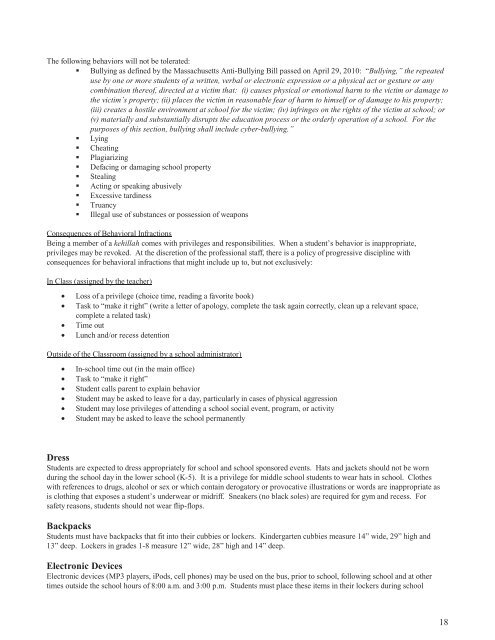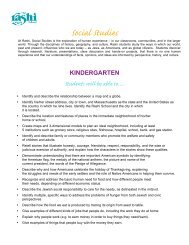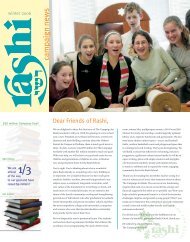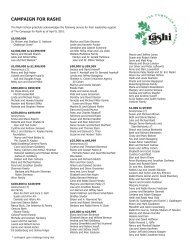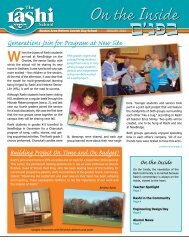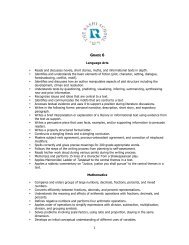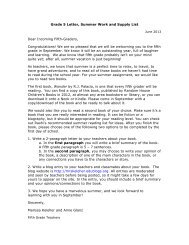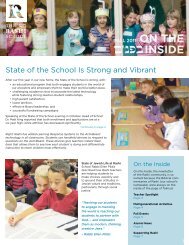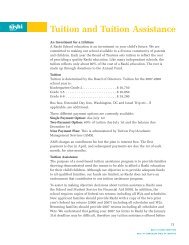Family Handbook - The Rashi School
Family Handbook - The Rashi School
Family Handbook - The Rashi School
Create successful ePaper yourself
Turn your PDF publications into a flip-book with our unique Google optimized e-Paper software.
<strong>The</strong> following behaviors will not be tolerated:<br />
Bullying as defined by the Massachusetts Anti-Bullying Bill passed on April 29, 2010: “Bullying,” the repeated<br />
use by one or more students of a written, verbal or electronic expression or a physical act or gesture or any<br />
combination thereof, directed at a victim that: (i) causes physical or emotional harm to the victim or damage to<br />
the victim’s property; (ii) places the victim in reasonable fear of harm to himself or of damage to his property;<br />
(iii) creates a hostile environment at school for the victim; (iv) infringes on the rights of the victim at school; or<br />
(v) materially and substantially disrupts the education process or the orderly operation of a school. For the<br />
purposes of this section, bullying shall include cyber-bullying.”<br />
Lying<br />
Cheating<br />
Plagiarizing<br />
Defacing or damaging school property<br />
Stealing<br />
Acting or speaking abusively<br />
Excessive tardiness<br />
Truancy<br />
Illegal use of substances or possession of weapons<br />
Consequences of Behavioral Infractions<br />
Being a member of a kehillah comes with privileges and responsibilities. When a student’s behavior is inappropriate,<br />
privileges may be revoked. At the discretion of the professional staff, there is a policy of progressive discipline with<br />
consequences for behavioral infractions that might include up to, but not exclusively:<br />
In Class (assigned by the teacher)<br />
• Loss of a privilege (choice time, reading a favorite book)<br />
• Task to “make it right” (write a letter of apology, complete the task again correctly, clean up a relevant space,<br />
complete a related task)<br />
• Time out<br />
• Lunch and/or recess detention<br />
Outside of the Classroom (assigned by a school administrator)<br />
• In-school time out (in the main office)<br />
• Task to “make it right”<br />
• Student calls parent to explain behavior<br />
• Student may be asked to leave for a day, particularly in cases of physical aggression<br />
• Student may lose privileges of attending a school social event, program, or activity<br />
• Student may be asked to leave the school permanently<br />
Dress<br />
Students are expected to dress appropriately for school and school sponsored events. Hats and jackets should not be worn<br />
during the school day in the lower school (K-5). It is a privilege for middle school students to wear hats in school. Clothes<br />
with references to drugs, alcohol or sex or which contain derogatory or provocative illustrations or words are inappropriate as<br />
is clothing that exposes a student’s underwear or midriff. Sneakers (no black soles) are required for gym and recess. For<br />
safety reasons, students should not wear flip-flops.<br />
Backpacks<br />
Students must have backpacks that fit into their cubbies or lockers. Kindergarten cubbies measure 14” wide, 29” high and<br />
13” deep. Lockers in grades 1-8 measure 12” wide, 28” high and 14” deep.<br />
Electronic Devices<br />
Electronic devices (MP3 players, iPods, cell phones) may be used on the bus, prior to school, following school and at other<br />
times outside the school hours of 8:00 a.m. and 3:00 p.m. Students must place these items in their lockers during school<br />
18


